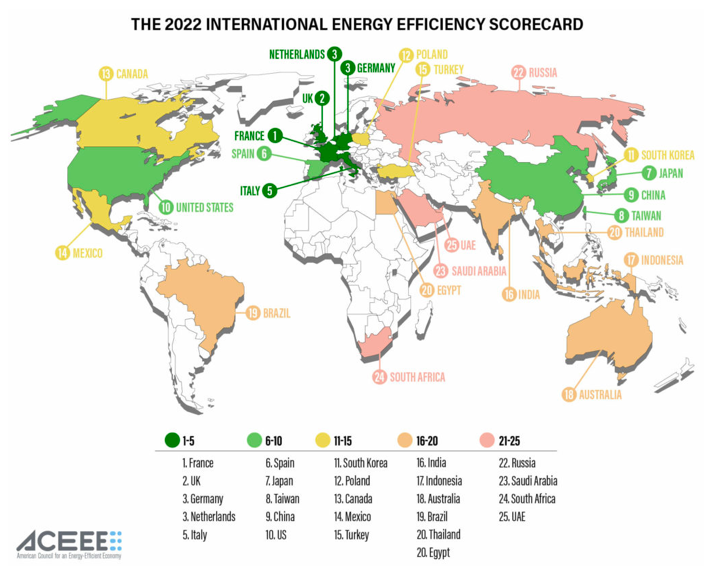The Top 5 Most Energy Efficient Countries (and What We Can Learn From Them)
With global CO2 emissions on the rise, taking a closer look at the top 5 most energy efficient countries in the world can give us valuable insights into how to reduce our own CO2 emissions.
Energy efficiency has never been as important as it is today. Not only because of an increase in energy prices due to a global energy crisis, but more importantly our resources on earth are finite, and the impacts of climate change are severe.
Experts from the United Nations state that energy efficiency is one of the least expensive ways to meet our global energy demands.
The American Council for an Energy Efficient Economy was founded to periodically rank and report on the energy efficiency in cities around the United States. Further, the council does also report on international energy efficiency.
The consortium evaluates and scores energy efficiency based on national efforts, buildings, industry as well as transportation. There are 36 metrics within the four categories which can be divided into twenty-three policy metrics and thirteen performance metrics.
The highest score adds up to 100, out of which 60 points can be earned from policy metrics, and 40 is the maximum score out of performance metrics.
In 2022 France was named the most energy efficient country with a score of 74.5, second in place was the UK with 72.5, followed by the Netherlands and Germany, and 5th in place was Italy.

As mentioned above the energy efficiency of a country is ranked based on four categories.
National Efforts
France has one of the highest spending on efficiency. France’s minister for energy transition Pannier-Runacher stated that $787 million are set aside by the government to support the citizens in reducing their energy use in their households. Additionally, tax credits and loan programs by the governments make a difference.
In the Netherlands, the government incentivizes its citizens to use energy sparingly and efficiently, by taxing the use of electricity and natural gas. Further, all five energy-efficient countries have developed extensive plans to meet their climate goals. France is planning to be completely carbon natural by 2050, the UK aims for 100% clean electricity by 2035, the Netherlands targets a 49% reduction of greenhouse gasses by 2030 and aims for a 95% reduction by 2050. Germany plans to be carbon neutral in 2045 which is five years earlier than the EU target.
Buildings
Buildings and their construction also have a significant effect on energy efficiency. Studies show that the building industry is responsible for about 40% of yearly carbon emissions. Out of those 40%, building operations account for 27%, while infrastructure materials and construction make up 13%. Therefore, in order to score high on energy efficiency ratings, countries need to build with more energy efficiency. Experts in the architectural field emphasize the importance of reusing, reducing, and sequestering when it comes to new constructions as well as renovating existing buildings.
Industry
Energy efficiency in the industry covers different aspects such as setting standards for motors, mandatory energy audits, and new investments in manufacturing research & development. The five countries ranked most energy efficient continue making efforts in all of these categories.
Transportation
Energy efficiency in terms of transportation covers topics such as new investments in rail transit versus roads, fuel economy standards, and smart freight initiatives. Just a few days ago it was announced by the French government that the country plans to invest around $100 billion in new railway infrastructure.
As part of the 2030 investment plan in clean energy, France has already invested another $2.5 billion in the production of electric and hybrid vehicles. Further, the country invested $1.2 billion on R&D activities with the aim to develop a low-carbon airplane (IEA, 2022).
Wrapping It Up
Energy efficiency is a crucial aspect of addressing climate change and reducing carbon emissions. Building design and construction, industrial standards, and transportation infrastructure all play significant roles in achieving higher energy efficiency. By investing in clean energy and implementing policies and initiatives that prioritize energy efficiency, countries can take significant steps toward reducing their carbon footprint and mitigating the effects of climate change. It is crucial that governments, businesses, and individuals work together to make energy efficiency a priority and prioritize sustainable practices in all aspects of their operations.



Leave a Reply